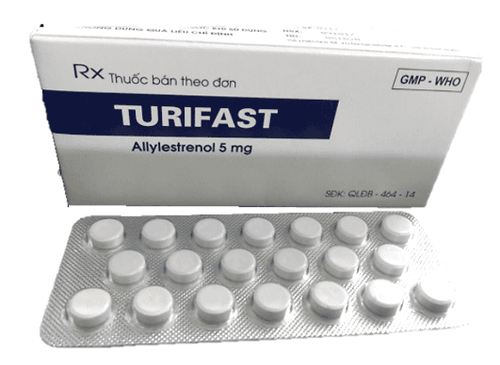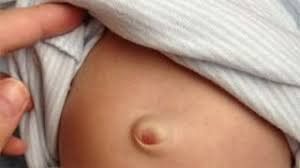This is an automatically translated article.
The article was professionally consulted by Specialist Doctor II Cao Thi Thanh - Pediatrician - Pediatrics - Neonatology Department - Vinmec Hai Phong International General HospitalPremature babies face many health problems on organ systems such as breathing, circulation, digestion, nerves,... Proper care and treatment for premature babies will help them develop. comprehensively, catching up with the growth momentum like full-term babies.
1. Characteristics of premature babies
Newborns are called premature when born before 37 weeks of gestation. About 12% of all babies are born preterm. Babies born before 28 weeks are extremely preterm, born between 28 and 34 weeks are preterm, and babies born at 34-37 weeks are late preterm.
Premature infants have the following characteristics:
The ability to store and regulate homeostasis is not complete: The baby is prone to hypothermia, hypoglycemia, hypocalcemia; The immune system is still defective due to the lack of antibodies transmitted from the mother, fetal infection causing premature birth, procedures causing hospital infections: The baby is prone to pneumonia, meningitis, arthritis, sepsis; The respiratory system (including lungs and respiratory center) is immature, lack of surfactant, alveoli are not fully formed, chest wall is unstable, respiratory muscles are weak: Children are at risk. have episodes of apnea or have endocardial disease , have chronic lung disease; Digestive system: Weak sucking reflex, swallowing; slow absorption of nutrients and vulnerable digestive system; immature liver. Therefore, the baby is at risk of problems such as aspiration, gastroesophageal reflux, functional intestinal paralysis, necrotizing enterocolitis, premature jaundice and risk of nuclear jaundice; The cardiovascular system is not yet complete: The baby may still have a ductus arteriosus, bradycardia, unstable blood pressure; Brain: Children are prone to cerebral hemorrhage, cerebral palsy, apnea, weak or unknown sucking/swallowing reflex; Hematology: Children are at risk of anemia, infection; Kidney: Children are prone to drug poisoning, dehydration or electrolyte disturbances; Other problems: Underdeveloped sex organs, retinopathy of premature babies, seizures, growth retardation in height, weight,...
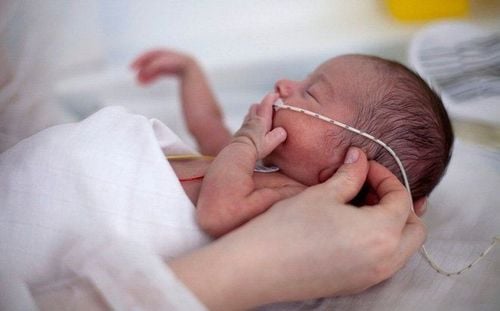
2. Means for taking care of premature babies
Depending on gestational age, weight, and underlying medical conditions, preterm infants may need different care and support. Common means of care include:
Incubator or heating bed. Instruments to monitor heart rate and blood oxygen; Breathing aids. Instruments to establish an intravenous line: Drug-liquid infusion. Gastrointestinal catheter; Antibiotics, drugs; Mother milk. Kangaroo care (skin-to-skin); X-ray, blood test
Trắc nghiệm: Thế nào là trẻ sơ sinh non tháng?
Trẻ sơ sinh non tháng rất cần được chăm và điều trị thật tốt để giúp giảm nguy cơ gặp phải các di chứng về tinh thần, vận động và sự phát triển sau này. Cùng theo dõi bài trắc nghiệm dưới đây để có thể nhận biết trẻ sơ sinh non tháng và có thêm kiến thức chăm sóc, nuôi dưỡng tốt nhất cho trẻ.The following content is prepared under supervision of Thạc sĩ, Bác sĩ y khoa, Ma Văn Thấm , Nhi , Phòng khám Đa khoa Quốc tế Vinmec Dương Đông(Phú Quốc)
3. How to take care of a premature baby
3.1 Regulating body temperature in premature babies Putting babies in an incubator or heating bed:
Incubator: Indicated for premature babies weighing less than 1,700g and children with diseases that make their body temperature unstable; Heating bed: Indicated for premature babies weighing less than 1,700g and sick children with unstable body temperature: used when performing procedures such as helping to breathe, changing blood, regularly sucking viscous sputum, ... 3.2 Respiratory support The respiratory system of premature infants is often incomplete. Can support breathing for the child:
If the child is breathing in the air that is not pink, you can give oxygen If the child shows signs of respiratory failure such as rapid breathing, moaning, chest constriction, apnea episodes , cyanosis of the skin and lips,... will be assisted with respiratory support by breathing NCPAP (respiratory continuous positive pressure through the nose) with a pressure of 4-6 cmH2O. If NCPAP fails, intubation and mechanical ventilation will be indicated. Use surfactant (surfactant) when indicated. Children with apnea: Using caffeine citrate intravenously.
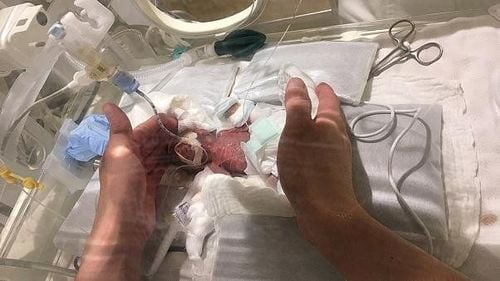
3.3 Limiting infection Ensure sterile technical equipment for child care, caregivers need to wash their hands frequently, disinfect incubators and ventilators every 48 - 72 hours; Pay attention to pathogens in the hospital environment such as Pseudomonas, S.Aureus, Klebsiella,... to choose the right antibiotic to use. Using antibiotics according to the antibiotic chart 3.4 Nutrition The baby's energy needs are 120 - 140 Kcal/kg/day to ensure the weight gain rate reaches 15g/kg/day; Feeding route: Including parenteral nutrition and oral nutrition. Intravenous nutrition is indicated in extremely preterm infants weighing less than 1,000g, with gastrointestinal disease (gastric perforation, intestinal atrophy, esophageal atrophy, small bowel atrophy, duodenal obstruction,...), with serious medical diseases that cannot be taken by mouth (gastrointestinal bleeding, severe respiratory failure,...). The oral route is the most physiological method and infants receiving parenteral nutrition should be switched to orally as soon as possible; When feeding children, it is necessary to ensure that they provide enough groups of necessary nutrients for the baby and the dose prescribed by the doctor.
4. Treatment of diseases in premature babies
Respiratory failure: Treat apnea and endocardial disease with methods prescribed by your doctor; Jaundice: Phototherapy is indicated earlier for premature infants and preventive phototherapy right after birth for all cases of premature babies weighing less than 1,000g.

5. Post-discharge follow-up
Children are discharged when serious diseases have been treated; stable body temperature (can sleep in a normal crib without an incubator); sufficient self-feeding; There is no apnea or low heart rate and parents can take care of the baby.
Eye and ear exams by appointment; Monitoring the consequences of mechanical ventilation and oxygen therapy: Pulmonary dysplasia, retinopathy; Monitor the child's physical, psychomotor and pathological development until the child is 2 years old; Vaccinate children according to the schedule advised by the doctor. Premature babies are very fragile, so they need to be cared for and treated carefully to help them survive, reduce the risk of mental-motor development sequelae, and catch up with growth. of full-term babies. Parents need to strictly follow the doctor's instructions in the care and treatment of premature babies.
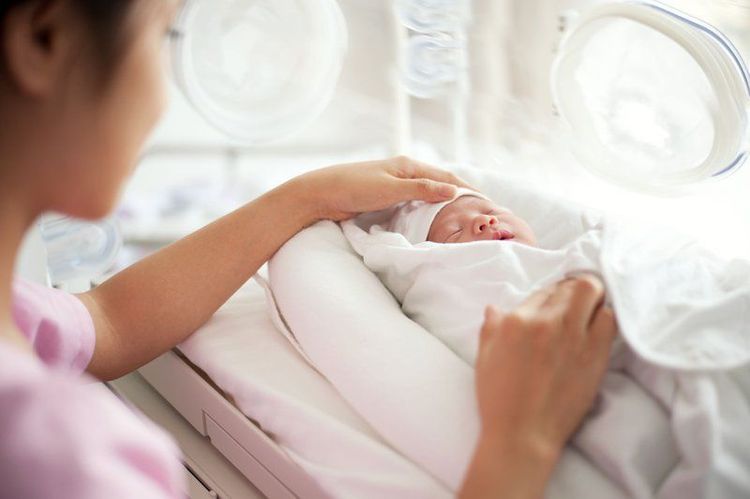
Pediatrics Department of Vinmec International General Hospital is the address chosen by many parents to examine and treat common diseases in children such as: otitis media, bacterial fever, viral fever, pneumonia in children. young,... With modern equipment, sterile space, minimizing the impact as well as the risk of disease spread, a team of leading specialists, rich in professional experience, and always dedicated in their work. Examination will help to take care of premature babies at home is no longer a concern of parents.
To register for examination and treatment at Vinmec International General Hospital, you can contact Vinmec Health System nationwide, or register online HERE.
SEE MORE
Feeding a 26-week-old premature baby with special measures at Vinmec What is preterm birth? 2 problems that premature babies often face and how to handle them Feeding a 26-week-old premature baby with special measures at Vinmec










